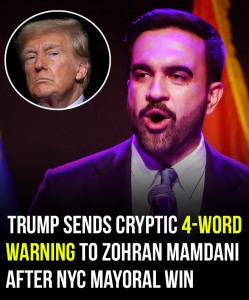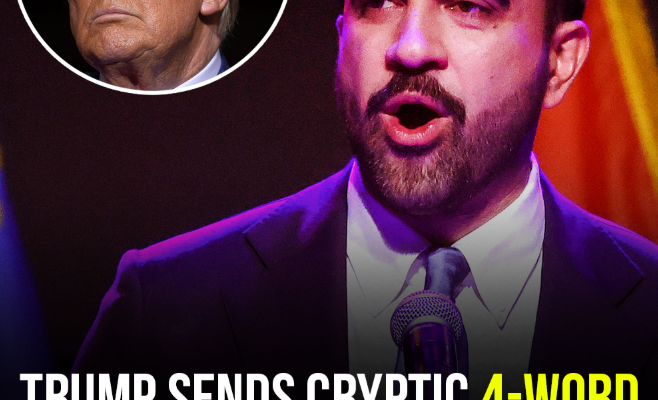
Donald Trump has once again set the internet ablaze with a mysterious statement following one of the most unexpected political outcomes of the year — Zohran Mamdani’s shocking victory in the New York City mayoral election. The former president’s four-word post, “AND SO IT BEGINS,” came just moments after Mamdani took the stage to deliver his own fiery four-word message aimed directly at Trump: “Turn the volume up.” What followed was a digital storm of speculation, interpretation, and tension that revealed far more than either man might have intended.
Zohran Mamdani, a 34-year-old Democratic Socialist and state assemblyman from Queens, made history by becoming New York City’s first mayor of South Asian descent and one of the most progressive mayors ever elected in a major American city. His victory speech on election night was not the typical cautious address filled with gratitude and promises of unity. Instead, Mamdani used the national spotlight to declare that his win was a rebuke to the billionaire class and to the politics of fear that he says Trump represents. “Donald Trump, since I know you’re watching,” Mamdani said, his voice rising above the roaring crowd, “I have four words for you: Turn the volume up.”
The line instantly went viral. Within minutes, #TurnTheVolumeUp was trending across social media platforms, drawing reactions from supporters, critics, and political analysts alike. For Mamdani, the phrase symbolized defiance — a promise that he would not shrink his message or his movement now that he was entering the halls of power. It was a call to his supporters to stay loud, stay visible, and keep pushing for radical change in a city often criticized for catering to the wealthy. But it also carried a message to Trump himself: Mamdani wasn’t afraid to challenge him directly, even from the mayor’s office of America’s largest city.
Trump’s response came swiftly and cryptically. Just as major networks confirmed Mamdani’s victory, Trump posted on Truth Social: “AND SO IT BEGINS.” The post contained no further explanation, no context, and no follow-up — just those four words in all caps, punctuated by ellipses. It was enough to ignite a firestorm. Commentators and political watchers began dissecting the meaning. Was it a threat? A warning? A declaration of political war? Some of Trump’s loyal supporters saw it as a rallying cry, a signal that the former president was preparing to confront the new mayor head-on. Others interpreted it as an acknowledgment that Mamdani’s victory marked the beginning of a broader ideological battle between Trump’s right-wing populism and the growing influence of democratic socialism in urban America.
The tension between Trump and Mamdani did not appear out of nowhere. In the weeks leading up to the election, Trump had taken an unusually active role in the mayoral race. He endorsed Andrew Cuomo, the former governor running as an independent, calling him “the only one who can save New York from disaster.” Trump also issued stark warnings that if Mamdani won, he might “cut off federal funds” to New York City, claiming that Mamdani’s socialist agenda would “bankrupt the city in six months.” The remarks drew condemnation from Democrats and even some moderate Republicans who saw the comments as an abuse of presidential influence. For Mamdani, Trump’s interference was political gold. He framed the mayoral contest as a referendum on whether New York would bow to the politics of intimidation or chart its own path. In that context, his victory speech was as much a message to Washington as it was to his voters.
“Turn the volume up” was not just a quip; it was a statement of intent. Mamdani’s campaign centered on big promises — rent freezes, expanded social programs, free public buses, and higher taxes on luxury real estate. His slogan, “A City for the Many,” drew comparisons to Bernie Sanders’s presidential campaigns and Alexandria Ocasio-Cortez’s congressional insurgency. Both figures publicly congratulated Mamdani on election night, with Sanders calling him “proof that working people can win even against the billionaires.” But Mamdani’s boldness also raised questions. Could he realistically implement his sweeping agenda? Could he govern a city of nine million people while openly feuding with a sitting president?
Trump’s four-word warning suggests that he does not plan to make it easy. Political analysts immediately linked the post to Trump’s earlier comments about withholding funds. Though the federal government cannot arbitrarily cut city budgets, the president does have leverage over infrastructure grants, policing programs, and housing subsidies. A tense power struggle could be brewing between the White House and New York City Hall — one that might spill into the courts. Mamdani seemed ready for that possibility, telling supporters in a later interview, “If the federal government wants to play politics with people’s lives, then we’ll meet them in court and in the streets.”
Beyond the immediate political clash, the symbolism of the exchange captured the nation’s attention. Two men, each wielding only four words, had drawn clear ideological battle lines. Mamdani represents a generation of younger, diverse progressives who see themselves as the moral counterweight to Trump’s populist nationalism. Trump, meanwhile, remains the defining figure of conservative America — the showman, the disruptor, the master of short, emotionally charged communication. In a sense, the duel between “Turn the volume up” and “And so it begins” is a perfect reflection of the modern political era: short, viral, emotional, and designed to dominate attention.
Mamdani’s supporters celebrated the exchange as a cultural moment, a declaration that progressives were no longer intimidated by Trump’s dominance of the national narrative. To them, “Turn the volume up” meant bringing more attention to inequality, racism, and climate justice — and refusing to back down even under federal pressure. But Trump’s followers read his post differently. Many online commentators in pro-Trump circles said the phrase “And so it begins” hinted at retribution or at the start of a broader political campaign to retake control of urban centers they believe have fallen to “radical leftists.” The dual interpretations show how polarized the country remains, even over something as brief as four words.
Still, the practical implications may soon overshadow the symbolism. Mamdani will need to prove that his fiery campaign rhetoric can translate into effective governance. City leaders, state legislators, and business groups are already questioning how his ambitious promises will be funded. Meanwhile, Trump’s administration faces scrutiny over whether it will use federal power to pressure one of the nation’s most important cities. If either side missteps, the standoff could spiral into a constitutional showdown over the limits of federal authority versus local autonomy.
Political historians have noted that New York City has long been both Trump’s birthplace and a recurring symbol in his political story — the city that made him, criticized him, and now, under Mamdani’s leadership, stands against him. That’s part of what makes this exchange so loaded with meaning. When Mamdani told Trump to “turn the volume up,” he was not just taunting a political opponent; he was reclaiming the city’s voice from the man who once used it to build his empire. And when Trump replied, “And so it begins,” he was reminding everyone that he has no intention of ceding that symbolic ground without a fight.
The coming months will reveal whether this tension becomes a prolonged feud or a defining political drama of the decade. For now, what’s clear is that both men understand the power of language in an age of social media. Neither needs a lengthy speech to make a point. Four words were enough to ignite a national conversation, to turn a local election into a front-page headline, and to remind America that politics today is as much about spectacle as it is about substance.
In the end, Zohran Mamdani’s victory represents a new chapter for New York City — one fueled by youth, diversity, and unapologetic progressivism. Donald Trump’s response signals that he views it not as a local upset but as the start of a broader ideological war. Between “turn the volume up” and “and so it begins,” the stage is set for a showdown that could reshape not only New York but also the nation’s political landscape

